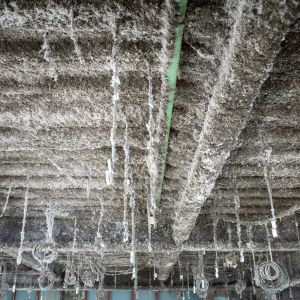The Differences Between Fire-stopping and Fireproofing
Ensuring the fire resistance of your building involves two crucial elements: fire-stopping and fireproofing. Businesses, property owners, and facility managers bear the responsibility of understanding the distinctions between these measures and their respective functions. Whether it's fire-stopping or fireproofing in Toronto, both play essential roles in safeguarding a building. EcoStar Insulation is the number one fireproofing service to turn to if you want to protect your property from fire.
Let's explore the differences between them and highlight the necessity of incorporating both.
Initial Confusion
 When contemplating fire safety, common associations involve fire sprinklers and alarm systems. While these elements are significant, they are designed to activate at later stages compared to fire-stopping or fireproofing. Due to the similarity in their roles as the first line of defence, there is often confusion surrounding them. Let's delve into each to clarify their purposes.
When contemplating fire safety, common associations involve fire sprinklers and alarm systems. While these elements are significant, they are designed to activate at later stages compared to fire-stopping or fireproofing. Due to the similarity in their roles as the first line of defence, there is often confusion surrounding them. Let's delve into each to clarify their purposes.
Firestopping
Visualize a building as a unified structure with multiple rooms. Fires can originate in any of these rooms, but the ability to halt or slow down the spread from one room to another is crucial for evacuation and emergency response. Firestopping involves the application of sealant at vulnerable points where fire could propagate, such as the junctions between walls, floors, and ceilings. By preventing fire from spreading through these weak points, the likelihood of limiting property damage and protecting individuals increases.
How does firestopping function?
Firestopping involves the use of materials to seal gaps surrounding plastic pipes or wires that may penetrate walls, ceilings, or floors. When exposed to fire, certain items like plastic pipes or wires can melt or change shape, prompting the expansion of some firestop materials due to heat. This expansion creates a sealing effect, preventing the spread of fire and smoke to other areas within a building, including different rooms and floors. It is crucial to select the appropriate firestop system for penetrating items to ensure effective performance in emergency situations. Common materials used for firestopping installation include composite sheets, firestop bricks/plugs, firestop mortars, pillows, prefabricated kit systems, putties, sealants (silicone, latex, intumescent), spray products, and wrap strips.
Fireproofing
While fire-stopping prevents the spread of fire and harmful gases, fireproofing in Toronto is geared toward shielding the structural elements of a building. It focuses on safeguarding the foundational components that prevent collapse or severe damage. During construction, fireproofing is applied to materials like steel or concrete to ensure the building's stability in extreme scenarios. Building fires can compromise the integrity of steel beams or cause concrete to expand, posing a threat to both the structure and its occupants.
What is the Mechanism Behind Fireproofing?
Fireproofing services use certain materials to safeguard a building's infrastructure against intense heat, such as fire, to maintain the structural member's strength. This method serves as a passive fire protection measure, aiming to uphold the building's integrity during a fire emergency. Typically, fire-resistance ratings range from 1 to 4 hours. Applying a suitable fireproofing system to specific structures enables them to attain a fire-resistance rating. Commonly employed applications for fireproofing installation encompass:
- High-Rise Products
- Commercial/Low Density
- Medium Density
- High Density
- Intumescent Coatings
- Rigid Board
EcoStar Insulation Ensures Proper Execution
With years of experience, EcoStar Insulation collaborates with clients to implement effective firestop measures. Our fireproof service installers are certified by major firestop product manufacturers, enabling us to assess field conditions and provide timely engineering judgments with technical support. Our experts undergo continuous training, ensuring adherence to contract specifications and best safety practices.



